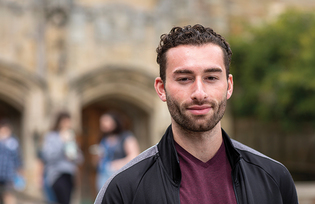
Bob Handelman
Gregory Kyro ’27PhD
New Hyde Park, New York
Doctoral program in computational
biophysical chemistry
What’s the focus of your research?
I’m developing AI models to study biochemical and biological systems.
How did you get interested in this?
In high school, I wanted to be a physician because I thought this was the best possible way to have a positive impact on the world. So in late high school/early college, I focused on biology, anatomy—thinking how I could develop tools to be applied to surgery, to medicine. In doing that, I realized that to actually gain a deep understanding of biology, you need to move into the field of chemistry. Chemistry goes down to a subatomic-level representation of molecules and systems, whereas biology rarely goes even as deep as the atomic level.
Then it started becoming fairly obvious that AI was becoming applicable to studying biological and complex systems. For example, a model called AlphaFold revolutionized biochemistry. It takes a protein sequence, which is like a chain of letters, and from that can accurately predict the three-dimensional structure of the protein more quickly than you could with other methods.
Has anything surprised you here?
A lot of the [scientific] research in the graduate school seems pretty safe compared to the science that was going on, let’s say, in the mid-twentieth century. Think about [J. W.] Gibbs [the brilliant Yale physicist, chemist, and mathematician] and cowboy science. If you’re trying to do something super-revolutionary, the probability of success is low. You won’t get a grant.
I should definitely mention that my research group provides the opportunity, for sure, to work on ideas that push boundaries of the field.
What do you think of New Haven?
I love New Haven. It’s the perfect blend of city and not-so-much city.
__________________________________________________________________
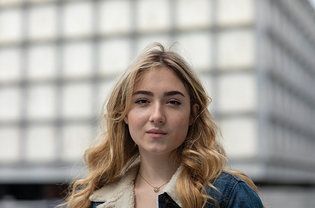
Bob Handelman
Hailey Talbert ’27
Falmouth, Maine
Grace Hopper College
Tell me about a couple of the courses you’re taking.
I’m taking Reading and Writing the Modern Essay and Writing Egyptology [Reflecting on Life and Death in Ancient Egypt, Mesopotamia, and the Bible].
Writing Egyptology. That sounds so unusual.
We’re focusing on pessimistic literature of the Old and Middle Kingdoms. We’ve just started learning about how you can learn about climate change or natural disasters from identifying artwork of the time.
What do you do outside of classes?
I’ve started writing for the Yale Daily News, and I’ve applied for the Yale Undergraduate Law Journal, as well as to be a guide at the Yale Center for British Art. In my free time, I’ve been doing oil paintings around campus. On Saturday, I’m hoping to paint Sterling Library. I like to paint live, en plein air. I find that art helps grow my gratitude of being here.
What do you miss from home?
I think I miss pine trees, which sounds silly. Of course, I miss my family so much; I’m really, really close to my parents and my younger sister and my two dogs. But I miss the sea and the trees and being around so much nature all the time.
And I definitely miss the familiarity of my town—whenever I go anywhere, I run into someone that I know. I work at our local lobster shack.
What’s the place called?
Town Landing Market. Lobster roll sandwiches are our main summer specialty.
Any tips for making a lobster roll?
Use as little mayonnaise as possible, and griddle the bun with butter. That makes for a pretty good lobster roll.
Thank you.
__________________________________________________________________
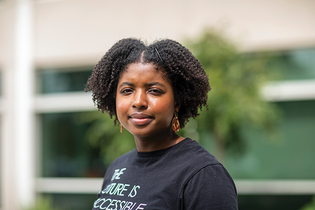
Bob Handelman
Jessie Laurore ’26MSN
Brockton, Massachusetts
Nurse-Midwifery Specialty, School of Nursing
What led you to midwifery?
After undergrad, I worked in DC doing research on issues affecting children and families. I was particularly interested in maternal and child health, and I learned about doulas. A doula is someone who provides educational and physical support before, during, and after labor. I was feeling like I wanted to work more directly with people, so I did doula training in 2020. That’s when I learned more about the midwifery model of care, which is very patient-centered and really honors the patient’s autonomy.
I started working as a “birth sister” at Boston Medical Center. I speak Haitian Creole, so I was paired with a lot of Haitian clients, including refugees. It was intense work, but I enjoyed being able to see the care of people there, and to advocate for them.
I love that midwifery has such ancient roots, that it’s knowledge that was passed down. Learning the history of midwifery, midwives have been so respected in their community and have made people feel so safe during birth. I think that’s really beautiful. That’s a big part of why I want to be a midwife—to continue the legacy of the midwives who came before me.
You’re entering this profession at a time when many states are limiting people’s reproductive choices. What are your thoughts?
As a midwife, I’m definitely committed to reproductive justice, bodily autonomy, and full-spectrum care.
Do people of color have unique needs when seeking health care?
Any culture has unique needs; that’s why cultural sensitivity is so important. I often use the term cultural reverence, and today I heard a professor say “cultural humility.” People are coming from so many different backgrounds. They may have practices or preferences that are important to them that you might not be aware of. So really listening is fundamental.
__________________________________________________________________
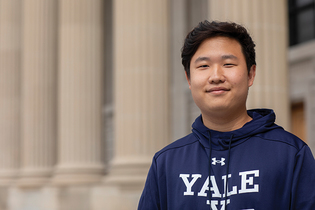
Bob Handelman
Taehoon Kim ’27
Seoul, South Korea
Morse College
What do you think you might major in?
Right now, computer science and cognitive science. Three of my courses are related to my majors: intro to computer science, intro to cognitive science, and intro to linguistics, which is part of cog sci.
How does linguistics relate to cognitive science?
So, cognitive science is very interdisciplinary, because it’s about how the brain functions—in total. Linguistics is a large part of that, because it’s about how people function in terms of processing language.
Tell me about ChatGPT. What is its role for you and your fellow students?
A lot of the professors have worked around it. They don’t ask questions that could be answered on ChatGPT. They’re more focused on your critical thinking skills: on how you develop your ideas, rather than on reading comprehension.
What cultural differences have you noticed in the US?
I’m kind of excited about what daylight savings is, because I have no idea, and it’s a weird concept to me. I heard it will be getting dark at 3 pm. That doesn’t sound great, but it sounds interesting. Also, we don’t have tipping culture in Korea.
Is there anything you’re especially looking forward to?
I’m excited for the YSO [Yale Symphony Orchestra] Halloween concert because I heard that’s really cool. And I’m excited about the Yale-Harvard game—I’m hoping we win.
__________________________________________________________________
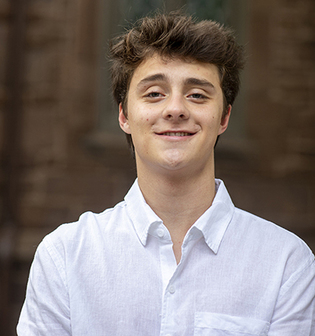
Bob Handelman
Conan Thibodeau ’27
Darien, Connecticut
Silliman College
Do you know what you want to study?
Linguistics and Russian. I’m taking three linguistics courses and an L5 Russian course.
A graduate course as a first-year?
I was born here, but I grew up speaking Russian with my grandparents, my mom—that entire side of the family. My mother grew up speaking Russian. She was born in Russia and grew up in Turkmenistan, which was then part of the USSR, and my dad was in the Peace Corps in Turkmenistan, and they met there.
Did a bilingual childhood contribute to your choosing linguistics?
Definitely. Also, we eat a lot of Central Asian foods, with names that are not in Russian, and hearing those names interested me. Although I’ve always been a very analytical person, I’m interested in the social sciences or humanities, not science. Linguistics is the perfect intersection between the humanities and STEM, because it is very analytical in one sense, but on the other hand, language allows for very much freedom and expression.
How else are you spending your time?
I just got into the Yale Symphony orchestra. I play viola. Not only do we get to play great music, and I get to hone my skills, but I’ll meet like-minded people who enjoy playing classical music. Orchestra is a very tightly knit community. It sounds cliché, but music has the power to unite people; when you’re making music with somebody, it’s a different level of bond between you two.
What’s on the program?
Also sprach Zarathustra by Strauss, and Mahler fifth, and then a Brahms piano concerto. I’m excited.
__________________________________________________________________
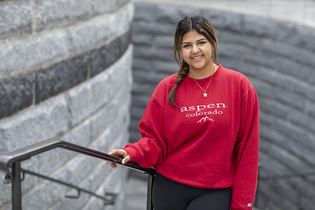
Bob Handelman
Diya Jha ’27
Frederick, Maryland
Jonathan Edwards College
How’s it going so far?
I’m really loving it. I’m so fortunate to have a great suite. We all click so well; we get lunch and dinner together every day. It’s just such a fun experience. We’re all studying different things, so we learn from each other.
I love the social life here. I think it’s amazing how everyone has a great balance of work hard, party harder, of doing extracurriculars and clubs and sports and then also focusing on academics. It is so nice to be surrounded by people who have that drive and passion to get an education.
Are you involved in extracurriculars?
Yeah, so with sports, I just started with the women’s water polo team. I’m also doing Yale tae kwon do. I’ve done that growing up—I’m a second-degree black-belt instructor. And then academic-wise, I’m applying for one of the Yale investment consulting clubs.
Has anything surprised you?
How welcoming the community is here. I think there’s this misconception that at these top universities it’s a cutthroat environment. My first day of multivariable calculus, I knew it was gonna be a hard class, so I asked everyone if they wanted to make a group chat, and we all help each other and go over the concepts, and it’s so nice to have that sense of community. I’ve made so many friends in my classes because we’re bonding over the hard problem sets. Even last night, I was in the library studying with one of my friends until 11:30. The problem set was due at 11:59, so we just made it.
 loading
loading